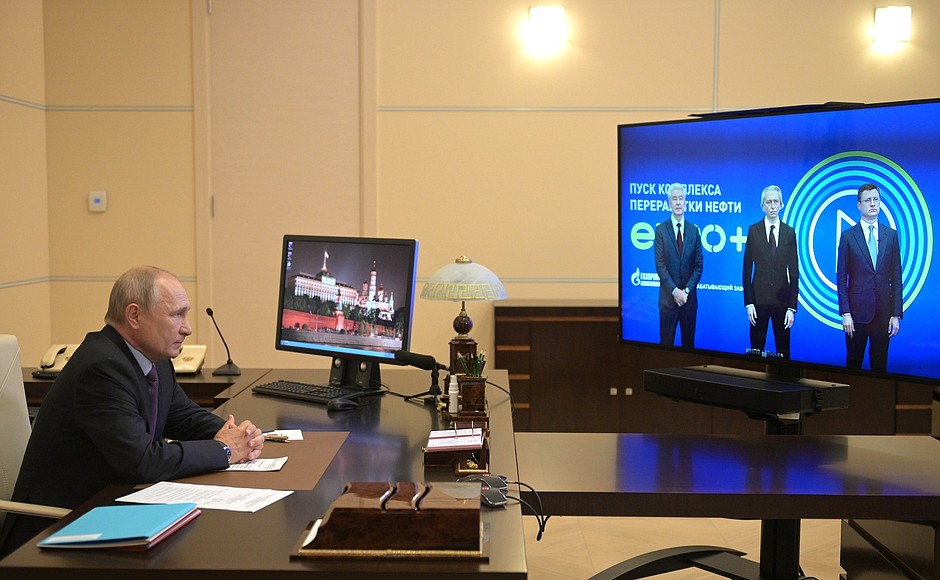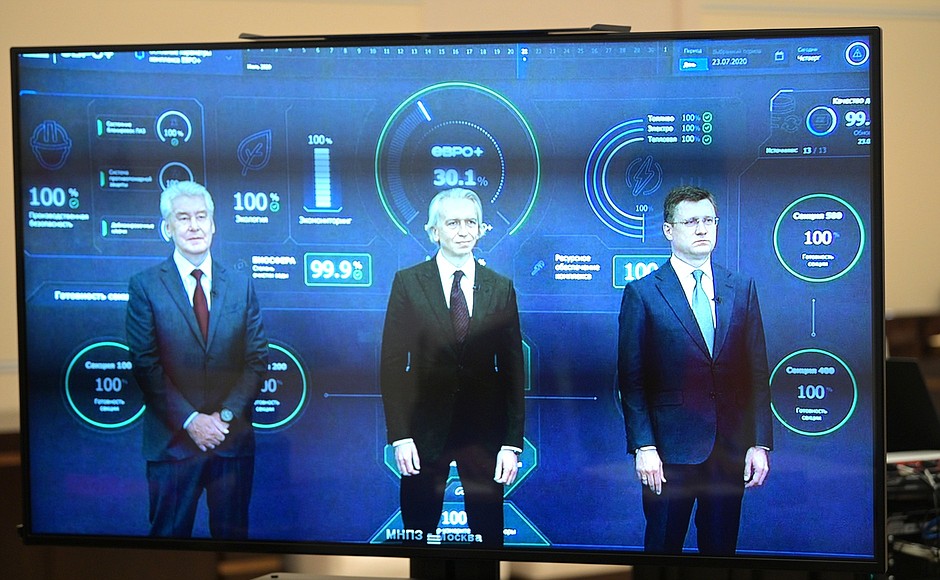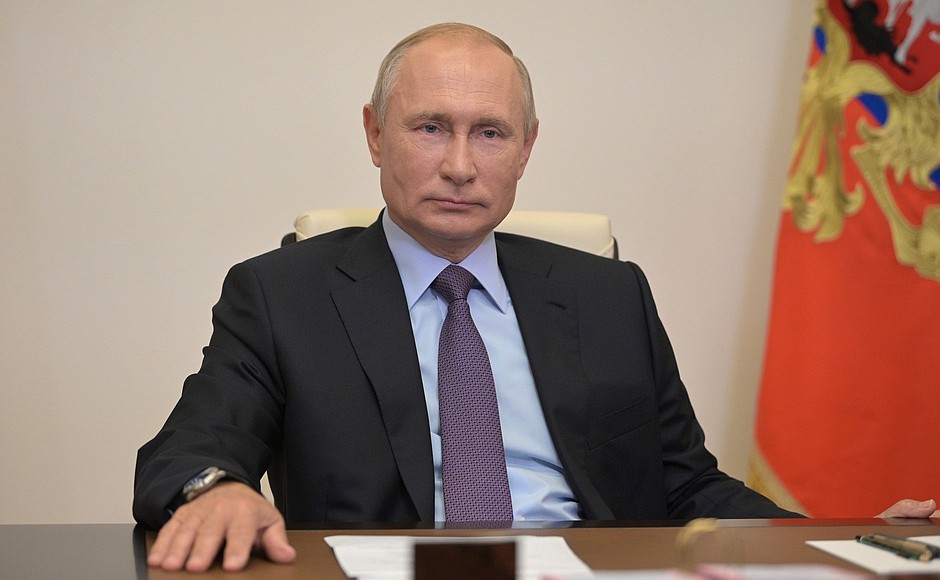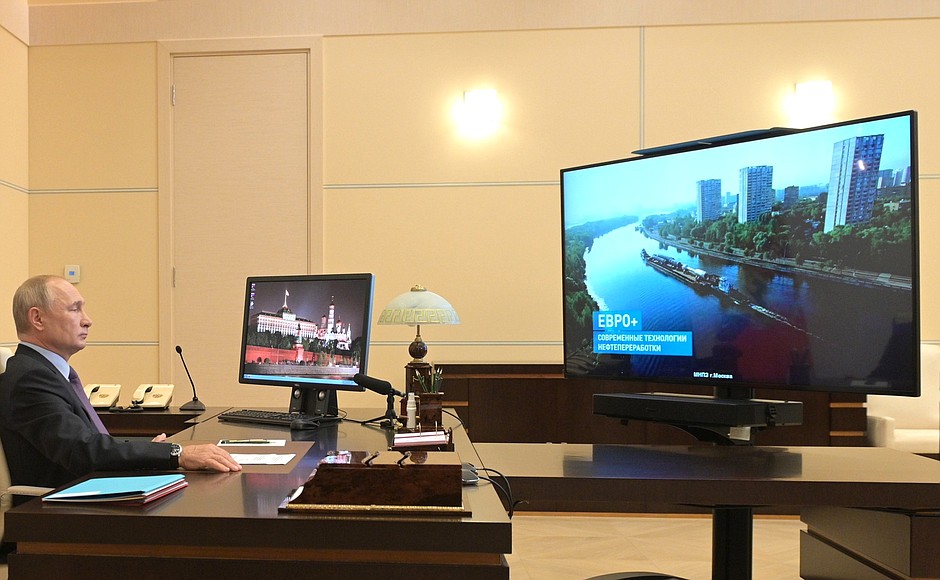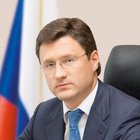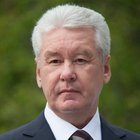Taking part in the launch of the new oil refining facility was also Energy Minister Alexander Novak, Moscow Mayor Sergei Sobyanin, Chairman of the Management Board, CEO of Gazprom Neft Alexander Dyukov and CEO of Gazpromneft Moscow Refinery Vitaly Zuber.
The Euro+ combined oil refining unit is a key project of the second stage of a larger programme for the Moscow Refinery’s ecological and technological upgrade. The new facility will replace five previous-generation ones, and will boost production while reducing the impact on the environment.
The Moscow oil refinery run by Gazprom Neft is the chief supplier of motor fuel for the entire Moscow Region including Euro-5 petrol and diesel fuel, aviation kerosene, road and construction bitumen.
* * *
President of Russia Vladimir Putin: Colleagues, good afternoon.
Today we are starting up a new high-tech facility, a Euro+ combined oil refining unit at the Moscow Refinery. Both Gazprom Neft management and [Gazprom Board Chairman] Mr Miller have regularly reported on its progress. I would like to congratulate you all on this momentous occasion.
A grand and very important project has been successfully implemented. The largest enterprise in the region’s fuel industry (accounting for 40 percent of the market), it has been a major project, one Moscow Region badly needed, with the largest domestic equipment manufacturers, scientific institutes and construction companies jointly contributing to it. As far as I can recall, the equipment came from 15 or 16 regions. Moreover, the construction was not even interrupted in the difficult conditions during the coronavirus epidemic. I would like to thank you all for your professionalism and certainly praise the team spirit you have developed during this job.
Due to the use of Russian technologies and equipment, an up-to-date industrial facility was created with a high level of automation, filled with digital technologies and solutions.
The new unit will allow the Moscow Oil Refinery to significantly increase the efficiency of oil processing, and it will increase the output of petrol, diesel fuel and aviation fuel. All this will allow for responding to the market demands with greater flexibility, and most importantly, will ensure stable and reliable deliveries of fuel to petrol stations and airports in the metropolitan area.
I would also like to note that with the launch of the Euro+ unit, the level of modernisation of the Moscow Oil Refinery will reach 80 percent. My colleagues will speak more about this, but if I am not mistaken, investments worth 350 billion rubles are planned for the period until 2025. In addition to upgrading the equipment and organising production and new units, new up-to-date waste treatment facilities were built and regular air monitoring also organised. All this sets radically new environmental standards and improves the quality of life of the people.
I am aware that work aimed at the comprehensive renovation of the plant will be continued, as I mentioned, until 2025. I hope that all that was planned will be fully completed.
A very important task for the Government and the regions is to create conditions for such industrial projects to be promoted more actively all around the country, make them interesting and profitable for businesses and investors, and create skilled, well-paid jobs for engineers, workers and other specialists.
In this regard, we should talk about thorough modernisation and we should build-up the capacities of our entire industrial base, import substitution projects, create efficient production facilities both in the traditional and new promising sectors. The Moscow Oil Refinery and the solutions used to modernise it can serve as a good example.
I would once again like to thank you all for the huge job you have done and to wish you every success and all the best.
<…>
